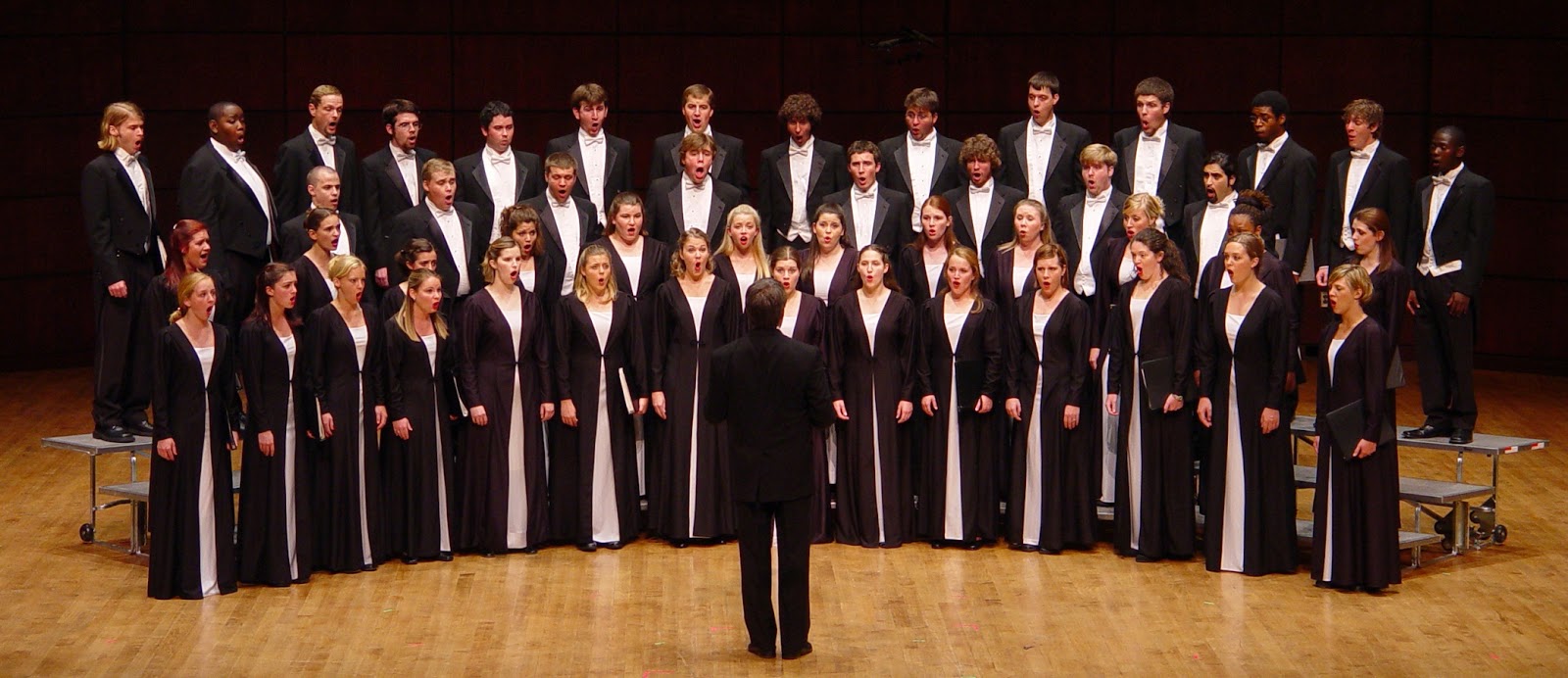What if?
Do you ever get the "what ifs?" You know. What if I had taken that job instead of this job. Or what if I had dated that person instead of this person? Or what if I went to that college instead of this college? I think many of us do the "what ifs". We can be perfectly content with our lives as they are, but we still wonder if we had made the right choice, or the smart choice, at some point in our past.
I think of my life right now, with the passion that I have for choral music, and my strong desire to direct a choir, doing the music that I love and that speaks to me. In this past year I have had the great fortune to be associated with many fine young musicians, all of them in either undergrad or graduate music programs. And I find myself envious of them, that they, at such a young age, are enveloped in this wonderful journey of discovering the joy of music. And when I see them and talk to them, my thoughts are "what if I knew then about my love of choral music as I know it now? What would be different?" And so I take a journey in my heart and mind, reliving the choices made, and the answer gives me great peace and acceptance.
I had been involved in music through my church since I was a boy, and when my family moved to San Clemente in 1975, I joined the church's youth choir. But I hesitated to join my high school choir. I knew the director, Richard Dastrup, was good, having soloed with the Mormon Tabernacle Choir. But I preferred the environment of my church's youth choir, which had a better girl-to-guy ratio, and had some of the "cool" church guys in it. The high school choir was, for me, a place filled with girls, and only a handful of guys, who were geeks or nerds, who had no luck with girls. In hindsight, I probably would have had better social relationships had I joined the choir, and maybe even had a dating life! But I did not join. I stayed out.
For college, I had the intention of getting my GE out of the way at Saddleback College, enroll at BIOLA in La Mirada, with a business major and a music minor. I had been studying the organ with a fine teacher, and was interested in pursuing an avocation as a church organist, along with being involved in business somehow. I attended Saddleback, taking business courses as well as other GE requirements, and I took courses in music theory and composition. Like in high school, I did not sing in the college choir. My music professor, Don Walker, had just left the choral directing position there, and his replacement, Al Brightbill, was one of my music instructors. I was still in our church's youth choir, enjoying that, and felt that involvement was adequate. However, that time at Saddleback College was crucial in my journey. For eventually, Don Walker became the choirmaster at the same church where I was taking organ lessons, and I was soon singing with him in the choir there.
Don was an alumni of St. Olaf in Northfield, Minnesota. St. Olaf is a liberal arts college that has gained an international reputation for having one of the finest choral programs in the nation. Don had studied with Olaf Christiansen, the son of the founder, F. Melius Christiansen. In the seven years I sang with Don, I was receiving a St. Olaf choral education. I had heard of the "St. Olaf" sound, but never had heard the sound itself until Christmas of 1989, when I saw the PBS special, "A St. Olaf Christmas". I found myself mesmerized by that marvelous sound of the blended choir, of firm foundational bases, of bright but not harsh tenors, of rich altos, all topped off with clear sopranos. I now KNEW what Don had been trying to do all along. It was THAT sound that he was working on with our choir. And that distinctive sound became my passion.
I must say here that the term "St. Olaf sound" is actually incorrect. It isn't a sound: it's a philosophy of singing based on singers blending their voices. And, as I continued on my musical journey, I found it was a philosophy that many other choral directors disagreed with, and even derided. When I tried out for the Master Chorale of Orange County in 1989, the assistant director knew I sang with Don. But because of his opinion of the St. Olaf technique and approach, and knowing that Don was a St. Olaf alumni, he made the audition difficult, even to the point that the four section leaders suggested that I be admitted to the Chorale, since I had the skill set to be in the group. But the assistant director blackballed me, and it wasn't until he left that I auditioned again, not mentioning my training with Don, and I was accepted. After two seasons singing with the OC Master Chorale, I auditioned for and was accepted into the Pacific Chorale, with the goal of eventually joining the Los Angeles Master Chorale, so I could work under Paul Salamunovich. However, during my first season with the Pacific Chorale we did the only two West-coast performances of the Boston Symphony Orchestra under Seiji Ozawa. As the Pacific Chorale was given a thunderous ovation in San Francisco, I knew that I was going to stay with them. I sang with the Pacific Chorale for four seasons, and found John Alexander's approach to choral music so mirrored mine. To this day I can still hear the sound of the wonderful soprano and alto sections in my mind's ear. During this time I also listened to any Robert Shaw and the Atlanta Symphony Chorus CD that I could get my hands on. Shaw's approach, although similar to the basic blended chorus philosophy of St. Olaf, was different. His sopranos were brighter yet not harsh. Basses were strong and supportive, and the altos rich yet not heavy. The results were clear diction, precise rhythms, and total clarity of choral tone. That sound began to shape the way that I produced my own choral sound, as well as influenced how I felt choral sound must be. I had reached my true passion for choral music, which continues to this day by listening to Shaw's smaller choral groups, the wonderful sounds of the Dale Warland Singers, and small groups such as Exultate and The Singers, both of which hail from Minnesota and have roots in both St. Olaf and The Dale Warland Singers. And I have begun to be associated with a wonderful, new, young and energetic choral group here in Orange County, the Choral Arts Initiative.
So, now, after all that, what is my "what if"? Well, I look back, and see this path I've taken. A path of discovering this deep passion for the choral art and its music. And I often go "what if I'd sung in the high school choir or at Saddleback?" And the answer is simple: if I HAD done those two things, I would have been more influenced by the choral approach of Dastrup and Brightbill, which, even though they created wonderful choral sound, their philosophies don't match mine as it is now. And what I have now is a result of decades of singing, observing, listening, and letting the St. Olaf, Robert Shaw and Dale Warland sounds infuse my soul. I would NOT be the same choral musician I am today, with an ear for a very specific type of choral sound, had I sung with Dastrup or Brightbill. I could be possible that, had I sung in high school and college, I would have gotten a degree, and I might be a choral director somewhere. But I chose and accepted a different path, and so when I ask "what if?", my answer is, "No. I took the right path - for me."
Soli Deo Gloria



Comments